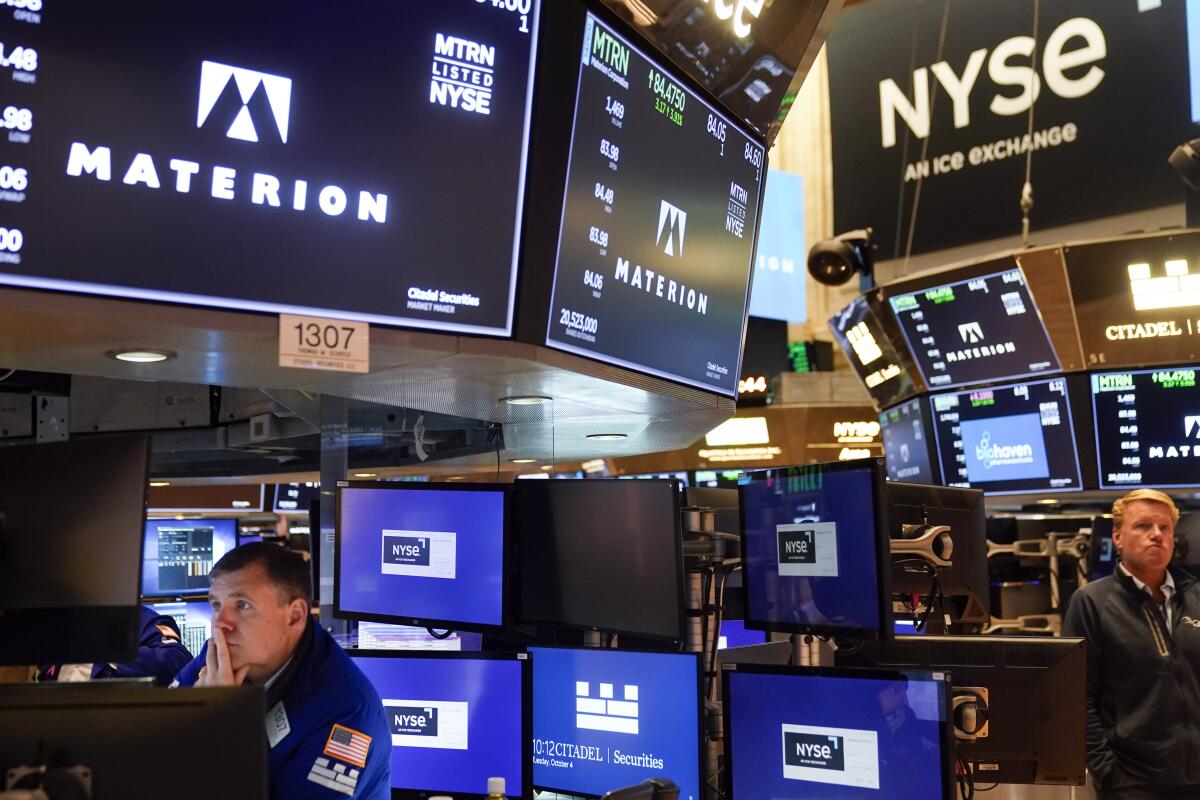Stocks slip, but still end up with big gains for October

- Share via
NEW YORK — Stocks closed broadly lower on Wall Street on Monday, a downbeat finish for major indexes in an otherwise banner October for the market, including the best month for the Dow Jones industrial average since 1976.
The Standard & Poor’s 500, the benchmark for many index funds, notched an 8% gain for the month, its first positive month since July. The Nasdaq composite rose 3.9% in October, also marking its first monthly gain in three months. The Dow rose 14% in the month. The Dow tracks just 30 blue chip companies, far fewer than other indexes, and can have bigger swings than broader indicators such as the S&P 500.
A market pullback in August and September, combined with better-than-expected quarterly earnings from many companies, helped put investors in a buying mood in October. Another factor was cautious optimism that the Federal Reserve might be ready to begin easing up on the aggressive pace of interest rate increases as it tries to squash inflation.
“It’s probably a combination of the fact that we were so deeply oversold, earnings weren’t as bad as feared, and that kind of sets up a recipe for a bounce,” said Michael Antonelli, market strategist at Baird.
“Whether that bounce holds or not depends” on your view of whether the Fed is likely to shift away from large rate hikes and whether inflation begins to decline, he added.
Your high-yield savings account may not be keeping up with rising interest rates. A little vigilance can help you squeeze out a much better return.
On Monday, the S&P 500 slipped 29.08 points, or 0.7%, to 3,871.98. The index is now down 18.8% so far this year.
The Dow fell 128.85 points, or 0.4%, to 32,732.95, the Nasdaq dropped 114.31 points, or 1%, to 10,988.15, and the Russell 2000 index of smaller-company stocks was little changed at 1,846.86.
Technology and communications stocks were the biggest drags on the broader market. Apple fell 1.5% and Alphabet, Google’s parent, fell 1.8%.
Stocks gained ground throughout October as investors shifted their focus to the latest round of corporate earnings. More than half of the companies within the S&P 500 have reported results and shown overall earnings growth of 2.3%, according to FactSet.
Companies have so far given investors a mixed bag of results and forecasts as Wall Street tries to get a better picture of the economy. Inflation remains stubbornly hot, and the Federal Reserve has been raising interest rates aggressively to try to slow down the economy and tame high prices. The strategy risks hitting the brakes too hard on economic growth and sending the economy into a recession.
Don’t let the bear market keep you from retiring. But there are a bunch of other financial and emotional factors to consider before taking the leap.
Investors this week will be watching for another extra-large interest rate increase from the Fed. The widespread expectation is for it to push through another increase that’s triple the usual size. Wall Street is roughly split on whether it will do the same in December or shift to a smaller increase, according to CME Group.
“Markets are itching to see a peak in this year’s aggressive hiking cycles but it would be a mistake to expect central banks will call an early end to their fight against inflation,” analysts at J.P.Morgan wrote in a research note.
Any signals from the Fed on Wednesday that it is prepared to pump the brakes on its rate increase policy will probably trigger a market rally.
“If there’s any language that’s dovish at all, the market will absolutely rip,” Antonelli said. “But I don’t think it’s going to happen. They can’t afford any dovish language with the [consumer price index] over 8%.”
If the Fed signals that it plans to stay on its current pace of rate hikes beyond November, that could lead to a sell-off Wednesday, said Farzin Azarm, managing director of equities trading at Mizuho Americas.
A stolen wallet precipitates a reporter’s years-long fight against identity thieves — and a system that doesn’t care and won’t help.
“The market would take it very, very negatively,” Azarm said.
Bond yields have been hovering near multiyear highs as the Fed continues to raise interest rates. The yield on the two-year Treasury, which tends to track expectations for Fed action, rose to 4.48% from 4.42% late Friday.
The 10-year yield, which influences interest rates on mortgages and many other loans, climbed to 4.07% from 4.02% late Friday.
Inflation has been a global problem. The European Union’s statistics agency, Eurostat, reported Monday that inflation hit another record in the 19 countries that use the euro currency, fueled by out-of-control prices for natural gas and electricity due to Russia’s war in Ukraine. According to Eurostat, annual inflation reached 10.7% in October.
Investors will be closely watching the U.S. government’s latest monthly employment report Friday for any clues on whether the hot jobs market is cooling as inflation squeezes businesses. Wall Street still has plenty of earnings to review from big companies this week. Pfizer will report its results Tuesday, followed by CVS on Wednesday. Starbucks reports its results Thursday.
More to Read
Inside the business of entertainment
The Wide Shot brings you news, analysis and insights on everything from streaming wars to production — and what it all means for the future.
You may occasionally receive promotional content from the Los Angeles Times.













